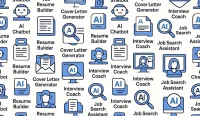Introduction: The Wage Debate That Could Redefine Your First Job
Entry-Level Hiring in 2025 is facing a major transformation as minimum wage reform takes center stage in economic and employment conversations. Across the United States and parts of Europe, policymakers are pushing for substantial increases in base pay some proposing $17–$20/hour federally. The ripple effects are already being felt across the job market, especially for those entering the workforce for the first time.
But this isn’t just about dollars and cents. It’s about opportunity, automation, and upward mobility. For millions starting careers or looking to pivot after layoffs or industry disruptions understanding how these proposals may impact hiring could be the key to staying ahead.
Let’s explore how the 2025 minimum wage proposals could reshape entry-level hiring—and what you should do about it.
Table of Contents
What’s on the Table? A Quick Breakdown
U.S. and Global Policy Highlights
- United States: The “Fair Wage Act of 2025” is proposing a federal increase from $7.25 to $17/hour, with phased implementation by 2027.
- California, New York, Washington: Already committed to hitting $20/hour by Q4 2025 in urban zones.
- European Markets: Germany, the UK, and France are also adjusting their minimums, with €12–€14/hour benchmarks proposed.
These changes are not yet finalized, but they’re gaining traction fast—especially among younger voters and economic justice advocates.
How Entry-Level Hiring Is Already Shifting
1. Fewer Low-Skill Openings, More “Essential Skill” Screening
Employers are rethinking who they hire at the base level. Rather than offering blanket access to entry-level roles, many now prioritize applicants with soft skills, digital literacy, or AI tool proficiency.
💡 Translation: “No experience required” jobs may become “some skills required.”
Industries affected:
- Retail (e.g., cashier → kiosk facilitator)
- Food service (e.g., line cook → automation operator)
- Logistics (e.g., picker/packer → inventory tech assistant)
2. Automation Is Quietly Replacing Repetitive Tasks
With wages going up, many companies are accelerating automation in roles where possible.
- Restaurants: Kiosks, QR ordering, and AI-powered prep stations.
- Retail: Smart shelves and automated inventory systems.
- Warehousing: Drones and robotic arms handling picking, packing, and scanning.
This doesn’t eliminate jobs—it reshapes them. Entry-level roles will increasingly focus on managing or interfacing with tech, not replacing it.
3. Rise of the Hybrid Entry-Level Role
Employers are blending responsibilities into single job titles. For example:
- Customer Associate + Inventory Assistant
- Receptionist + Social Media Coordinator
- Warehouse Worker + Equipment Troubleshooter
This creates both challenge and opportunity. Candidates with cross-functional skills—communication + basic tech, logistics + safety compliance—are now in higher demand.
🔎 Ready to Pivot Into a Better-Paying Career?
With minimum wage proposals reshaping entry-level hiring in 2025, now is the time to act. Whether you’re just starting out or shifting industries, WhatJobs.com connects you with the employers who are evolving—not eliminating—entry-level roles.
👉 Explore Future-Ready Jobs on WhatJobs.comWho Benefits? And Who May Be Left Behind?
Winners:
- Career Pivoters with Upskilled Credentials: Workers who’ve completed online certificates (e.g., Google, Coursera, LinkedIn Learning).
- Young Professionals with Soft Skills: Reliability, adaptability, and customer service still dominate hiring matrices.
- Workers in Union-Supported Roles: Labor unions are negotiating higher floors—and added protections—in retail, transport, and care work.
At Risk:
- Low-skill workers without access to training.
- Gig workers in non-regulated sectors (e.g., app-based delivery or ride-share roles, where protections lag behind).
- Rural job seekers, where wage hikes may lead to job consolidation or closures in smaller firms.
Career Strategy: What Should Job Seekers Do Now?
Whether you’re a new graduate, returning parent, or someone switching sectors, the landscape is changing. But with change comes a chance to reset your trajectory.
1. Level Up Your Digital Literacy
Even entry-level admin, sales, and service roles now expect:
- Basic Excel/Google Sheets skills
- Familiarity with digital point-of-sale systems
- Comfortable use of Slack, Zoom, or CRM platforms
Try: Grow with Google, Coursera, or LinkedIn Learning
2. Get Comfortable With AI-Enhanced Work
You don’t need to be an engineer—but knowing how to work with AI (think scheduling tools, inventory tracking, resume scanners) gives you a leg up.
Tip: Start with tools like ChatGPT, Grammarly, or Trello to streamline tasks and boost productivity.
3. Target Growth Sectors
Certain industries are growing despite rising wage costs, including:
- Healthcare (support roles, not just clinical)
- Green energy and installation tech
- Logistics and delivery network coordination
- Customer experience (CX) and digital support
These are recession-resilient and generally offer quicker promotions.
4. Shift from “Any Job” to “Strategic First Jobs”
If minimum wage roles become more selective, treat your next job as a launchpad—not just a placeholder. Look for roles with:
- Internal training pathways
- Tuition reimbursement or micro-credential support
- Career ladders with manager visibility
How Employers Are Responding
Major companies like Target, Chipotle, Amazon, and Home Depot have already increased base wages or announced plans to. But they’re also:
- Rethinking workforce planning: fewer hires per location, but better pay and benefits.
- Creating training tracks: internal certifications before promotion.
- Investing in automation and upskilling tools: especially in HR and operations.
For employers, this isn’t just a cost—it’s an evolution in how they build talent.
🚀 Final Thoughts: Don’t Just Survive the Shift—Leverage It
The 2025 minimum wage proposals are not a finish line—they’re a fork in the road. Some jobs may disappear. Others will transform. And many new ones will emerge where human skill meets technology.
If you’re planning a career change, entering the workforce, or reevaluating your path, use this moment to reposition strategically. Higher wages create better working conditions—but also higher expectations. With the right preparation, you’ll be more than ready.




